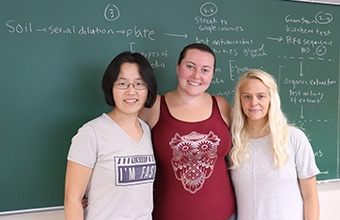College of Arts and Sciences Newsroom

Discovery-Based Research
This fall, University of Dayton assistant professor Yvonne Sun will introduce students in her microbiology lab course to the potential rewards and pitfalls of real-world research through her new partnership with the Tiny Earth network.
Founded by University of Wisconsin-Madison professor Jo Handelsman, Tiny Earth is a network of instructors and students focused on crowdsourcing antibiotic discovery from the soil.
Tiny Earth’s goal is to encourage students to pursue careers in science through discovery-based field and laboratory research in introductory courses, with the potential for global impact. It also aims to address the world’s diminishing supply of effective antibiotics by having many student researchers concurrently tackle the same challenge by hunting for new antibiotic organisms in soil samples.
Sun, who joined the University of Dayton faculty in 2014, was one of 25 partner instructors who attended a five-day training program in July at the University of Connecticut. She joins a growing community of educators and researchers from 14 countries and 40 U.S. states.
Unlike standard laboratory courses, which often involve repeating classical experiments to reproduce known results, the discovery-based research model engages students in authentic research experiences in a classroom setting.
“Students should be excited, because I don’t know what the results are going to be,” Sun said. “It’s not like other lab classes where you know exactly what’s going to happen. I have no idea how many bacterial colonies are going to generate antibiotics or what obstacles the students will face.”
Nine juniors and seniors in one section of Sun’s general microbiology lab class will pilot the new course-based undergraduate research experience, or CURE. They will collect soil samples on the University of Dayton campus, grow bacteria colonies and then test them in the lab, in hopes of discovering new compounds.
The CURE approach allows Sun to expose a greater number of students to authentic research, despite limitations on her time, lab space and research funding. Students apply their newly learned skills to a real-world problem while developing their own approaches and ideas.
“I want students to think about: ‘If you want to find bacteria that can produce antibiotics, where would you want to go and why do you want to go there?’ So, the students are part of the research endeavor from the very beginning — they are part of the design,” Sun said.
Sun said the odds of finding bacteria that can produce antibiotics are high. Of the hundreds of students trained to date by the Tiny Earth network, only one had bacteria that failed to generate a colony that produced antibiotics.
“This is very common behavior for bacteria in soil, because the bacteria live in the soil together, so they are constantly fighting each other for nutrients,” Sun explained. “It is natural for them to produce antibiotics to kill off competition. Now, whether the antibiotics are novel and also nontoxic, that’s another issue.”
In addition to learning technical skills, students also discover that it’s OK when things don’t work, said Erica Rinehart, a University of Dayton biology doctoral student from North Lima, Ohio.
“You just have to troubleshoot and critically think about why it didn’t work and what you can do to make it better,” said Rinehart, who will serve as graduate teaching assistant and run the lab for the pilot class.
Sun hopes to incorporate discovery-based research into all of her general microbiology lab courses, or possibly develop a separate lab dedicated to this type of experiential learning.
Tiny Earth’s network of students and instructors share research findings and best practices. Headquartered at UW-Madison’s Wisconsin Institute for Discovery, the program is taking steps to build a database of compounds discovered by students and build a chemistry hub to centrally analyze samples. Tiny Earth also has partnerships with the Joint Genome Institute and the Illumina Corporation.
“Building this network is not just good for teaching, but also my own research program,” Sun said.
- - Dave Larsen, communication coordinator, College of Arts and Sciences
